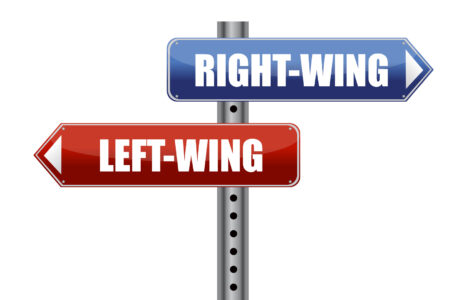
You’ve seen the ads, you know that cheque is coming… are you feeling good about the July UCCB payment that’s on its way? After all, 100% of families with children will get it! Do you care about what you gave up to get it?
I do. I seriously question why we are all paying higher distortionary taxes so that our government can hand out bigger cheques to every single family with a member under 18. Someone asked me to explain what that means in non-economist terms. I normally take an entire semester to teach this type of thing, but came up with the following over-exaggerated example to make some key points. (No claims to be portraying any typical families from the 2015 Budget here.)
My world today: there are 4 families, some with kids and some without, with earnings at $40,000 or $100,000. There are no taxes or benefits in place to start. If a tax is introduced to this world, it must be a flat tax on earnings.
Now, I’ve heard many people say the UCCB, as a demogrant, just seems more ”œfair”, because everyone benefits and that seems nice. I think they have the following in mind. In my example world today, we introduce a demogrant of $2000 to anyone with a child. To fund this, we implement at 1% flat tax on all earnings. All this really does then is transfer funds from families without kids to families with kids. This type of transfer can be viewed as improving equity, in that the families with kids require more for basic consumption than those without, represented by the last column of Table 1. We care about kids and feel good about this.
Table 1: World with demogrants and no behavioural response to taxes:
| Family | Kid | Earnings | Demogrant | 1.43% Flat tax | After tax/transfer |
| 1 | 1 | 40000 | 2000 | 571 | 41429 |
| 2 | 0 | 40000 | 0 | 571 | 39429 |
| 3 | 1 | 100000 | 2000 | 1429 | 100571 |
| 4 | 0 | 100000 | 0 | 1429 | 98571 |
| Totals | 280000 | 4000 | 4000 | 280000 |
But there’s an important assumption here: we introduced a tax on earnings and assumed people are willing to work as much as they did before? Not likely. Studies have found labour supply elasticities to be fairly small, even close to zero for men. However, we should not assume a zero response in labour supply. Moreover, in the real world our tax base is much broader than earnings. To make the implications of introducing higher income taxes, I create an exaggerated response: Suppose when we introduce a tax, people are likely to work 5% less than they did before. If they do that, and we want to raise enough funds for the demogrant, we’d also have to raise our tax rate a bit, to 1.5%.
Table 2. World with demogrants and behavioural responses to taxes:
| Family | Kid | Earnings in no-tax world | Taxable earnings | Demogrant | 1.5% Flat tax | After tax/transfer |
| 1 | 1 | 40000 | 38000 | 2000 | 571 | 39429 |
| 2 | 0 | 40000 | 38000 | 0 | 571 | 37429 |
| 3 | 1 | 100000 | 95000 | 2000 | 1429 | 95571 |
| 4 | 0 | 100000 | 95000 | 0 | 1429 | 93571 |
| Totals | 280000 | 266000 | 4000 | 4000 | 266000 |
We still have a simple transfer between families with and without kids, but the total income of the world is made smaller. Was that transfer worth it?
When economists use the term distortionary, its these types of behavioural effects that we are referring to. A perfectly efficient tax would have no behavioural effects, but tends to be problematic if we care about equity in terms of achieving a more equitable distribution of resources. Income taxes are known to be distortionary and have real costs for the economy. Often, we’re willing to accept some efficiency costs as long as it achieves an equity goal.
Economists care about balancing equity and efficiency. (Just wanted to emphasize that.)
What I want people to take away from this: think about the alternatives and how we could design policy with both equity and efficiency in mind. For example, in my little world, we could have created a benefit that targets low income families and uses a progressive tax system:
Table 3: Alternative world with targeted benefits and progressive taxes:
| Family | Earnings in no-tax world | Taxable earnings | Benefit | 1.03% progressive tax | After tax/transfer | |
| 1 | 1 | 40000 | 40000 | 2000 | 0 | 42000 |
| 2 | 0 | 40000 | 40000 | 0 | 0 | 40000 |
| 3 | 1 | 100000 | 97500 | 0 | 1000 | 96500.04 |
| 4 | 0 | 100000 | 97500 | 0 | 1000 | 96500.04 |
| Totals | 280000 | 275000 | 2000 | 2000 | 275000 |
In this world, tax rates are lower and cause smaller behavioural changes. The lower income families still get the help they need to cover child costs, and all families have more in their pockets at the end of the day.
I would like those families who think it seems ”œfair” for all kids to get a cheque to seriously question what they and other Canadians have to give up to get that demogrant. Because you are giving something up, and there are alternatives.
Note: I meant to submit this a while ago. I know the Liberal Party’s ”œFairness for the middle class” document was just released. I haven’t read it yet, but given the tweets I’ve seen so far, the UCCB and child benefits are an issue. As a matter of disclosure, I have not been consulted by any party on child benefits.









